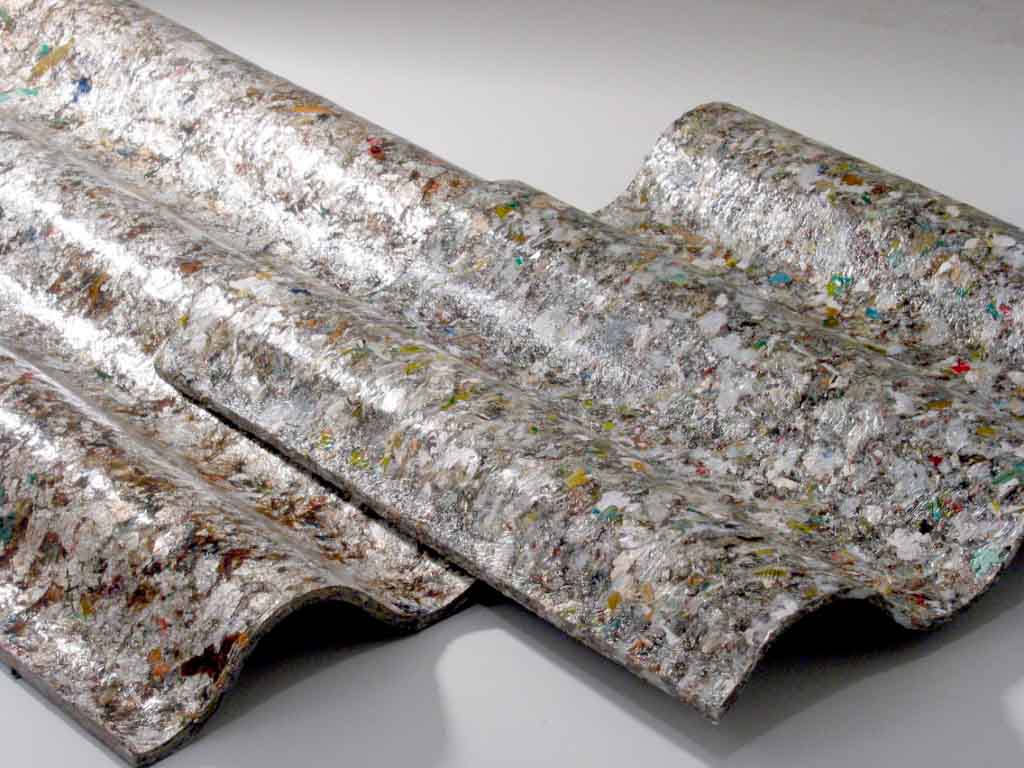The ecological tile, developed in partnership between Associação Vira Lata and Petrobrás, represents a significant innovation in civil construction. This project reflects a growing trend in the construction materials market, where sustainability and recycling are priorities.

Ecological tiles, also known as fibroasphalt tiles, are produced using paper and cardboard, offering a more sustainable alternative to traditional materials.
The collaboration between these institutions aims not only to promote the reuse of materials, but also to meet the demand for construction solutions that are both economical and environmentally responsible. Eco-friendly roof tiles are a response to current market needs and an important contribution to sustainable construction.
Ecological Tile Manufacturing Process
The manufacturing process of ecological tiles is fascinating and demonstrates how recycling can be effectively incorporated into civil construction. The tile is produced from a “paste” that combines plant fibers, predominantly cardboard, with asphalt bitumen. Each tile requires approximately 1.5 kilos of cardboard, which represents an efficient way of reusing a material that would otherwise be discarded.
Cardboard, a widely available and recyclable material, is essential in the composition of ecological tiles. The use of this material contributes significantly to the reduction of waste and promotes the circular economy in the construction industry. The addition of asphalt bitumen guarantees the durability and resistance of the tiles, making them suitable for different climatic and usage conditions.
Benefits of Ecological Tiles
Eco-friendly roof tiles offer a number of benefits that make them an attractive choice for construction projects. Among the main advantages is their excellent performance as thermal insulation. This means that they help maintain the internal temperature of buildings, reducing the need for heating and cooling systems, which can result in energy savings.
In addition to their insulating properties, eco-friendly tiles are excellent sound reducers. This feature is especially important in urban areas or in places where acoustic control is required. The flexibility and lightness of the tiles are also notable features. They can be used to create parabolic arch roofs, offering a distinctive and functional aesthetic.
Technical Specifications of Tiles
Ecological tiles have specific dimensions that are suitable for a wide range of applications. At 1.60 meters long, 0.60 meters wide and 3 millimeters thick, each tile weighs about 3 kilos. This lightness makes them easier to handle and install, reducing the effort and cost associated with laying the tiles.
The varied coloration of ecological tiles allows for greater design flexibility, making them an attractive option for different architectural styles. The ability of the tiles to adapt to curved and complex shapes expands the possibilities for use in innovative architectural projects.
Environmental Impact and Sustainability
The use of ecological tiles represents an important step towards sustainable construction and environmental preservation. Recycling cardboard to produce tiles reduces the amount of solid waste and minimizes the demand for new materials. This process contributes to the circular economy, where materials are constantly reused and recycled.
Furthermore, the production of ecological tiles results in a smaller carbon footprint compared to traditional building materials. The reduction in the use of non-recyclable materials and the efficiency in the use of natural resources make ecological tiles an eco-friendly choice, aligned with the best sustainability practices in civil construction.
The Future of Ecological Roof Tiles
As demand for sustainable solutions in the construction industry continues to grow, green roof tiles are well-positioned to become an increasingly popular option. Continued innovation in the design and production of roof tiles made from cardboard and other recycled materials could lead to further improvements in performance and efficiency.
The partnership between Associação Vira Lata and Petrobrás demonstrates how collaboration between different sectors can result in innovative and environmentally beneficial solutions. As more construction projects adopt eco-friendly roof tiles, the positive impact on the environment will be magnified, promoting more sustainable and responsible construction.
Check out other interesting facts about recycling clicking here.
Learn how to make art by recycling, Click here.




Good afternoon friends, I am responsible for the projects area of the Piratingauna OSCIP and I intend to develop a project to produce tiles from paper and cardboard, to generate work and income, and I would like to have an idea of open space and covered space, infrastructure and types of equipment and equipment costs, and if possible, you can inform me.
I am grateful and await your response.
Louis Gonzaga.
Brasilia DF.
061 – 98075151
Luiz, do a search in our search area to find companies or professionals that can help you:
http://setorreciclagem.com.br/reciclagem-maquinas-equipamentos
Hello Luiz, I am a Civil Engineering student, and I am carrying out research of the same nature for the construction of a project, which will be an ecological tile factory, I would be grateful if you could share your research with me.
Ana Paula Castro
E-mail: [email protected]
Contact: 75 9 9705-5411
There are things that we say with the best of intentions... it seems like nothing, but when you say that something goes "against" something else, you are saying that it is going AGAINST something else. Please, to highlight this important topic, correct the text, writing "the manufacture of ecological tiles (fiber asphalt tiles) for commercialization is IN ADDITION TO a trend in the construction materials market. (IN FAVOR OF, ADDING TO)… With much affection, just to highlight the ecological initiative.
Fixed, Carla. Thank you very much for the review <3
What worries me, speaking of environmental issues, is the use of petroleum derivatives in this mixture…
Is this safe for health?
Is it ecological?
Is it sustainable?
Will it generate other waste that harms the environment at any stage of its production and also during disposal?
How do I purchase cardboard tiles?
Type Ecological Tile in our search area (click on the link) and consult the suppliers that will appear: http://setorreciclagem.com.br/reciclagem-maquinas-equipamentos
I would like guidance and partnership to carry out this project at my school.
Very good, the problem is that it is more expensive than a zinc tile. If it could be recycled to be cheaper it would be worth it…